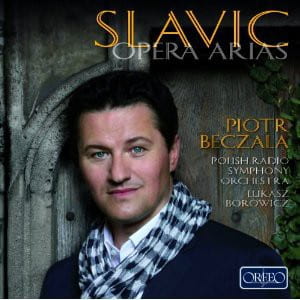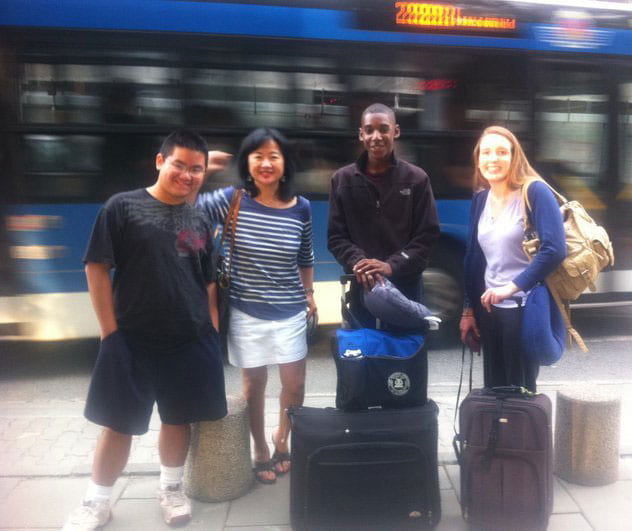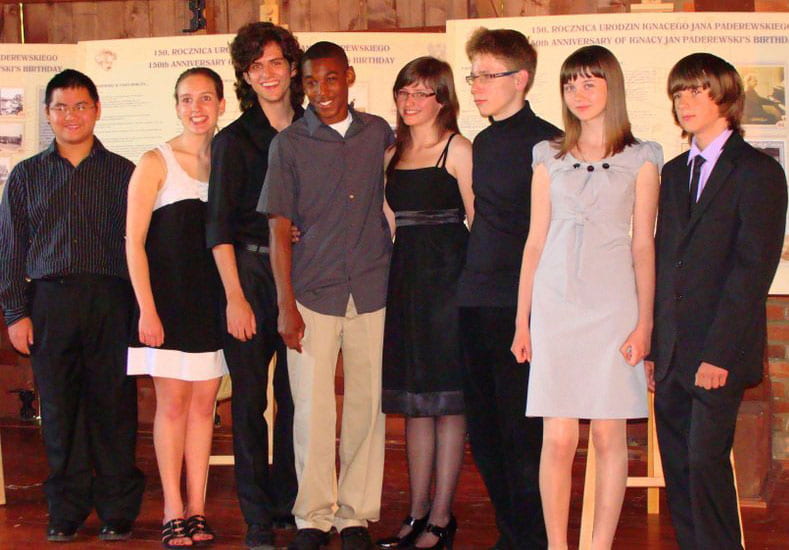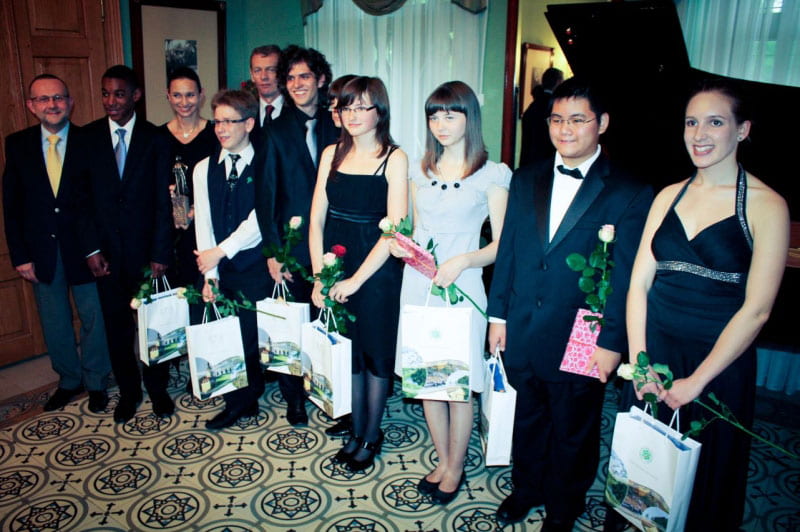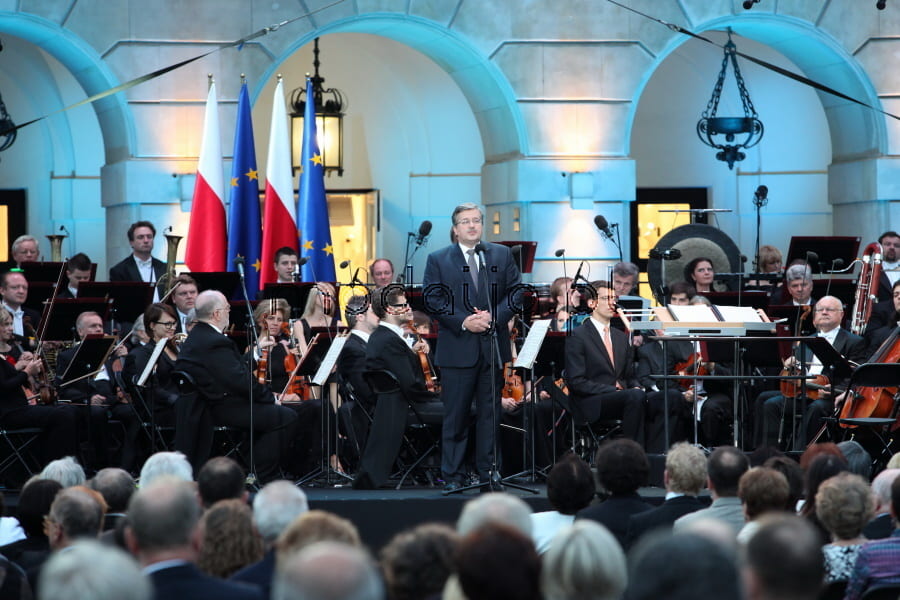Polish Music Newsletter Vol. 17, no. 7
Paderewski News
Paderewski Festival Delegation & Youth Exchange
On June 23, three former winners of the Paderewski Festival Youth Piano Competition—Jordan Adams (16), Madeline Anderson (15) and Evan Lin (14)—travelled from the Central Coast of California to Kraków, Poland with their chaperone, Bianca Lin. There they joined up with a delegation representing the Paderewski Festival in Paso Robles, which included Paso Robles Mayor Pro Tem, John Hamon, as well as Festival Board members Marek Zebrowski, Marjorie Hamon, Krysta Close, Steve Cass and Alice Cass. These students and representatives of the Festival had ventured to Poland with these goals in mind: to expand the cultural experiences and musical skills of the youth of central California; to create greater awareness of the Paderewski Festival in Poland; and to generate new connections and energy amongst Polish partners for the Festival and Exchange.
 The first order of business was attending the unveiling of the Paderewski monument (June 24), donated by Paso Robles resident Harry E. Blythe, at the Institute of Musicology of Jagiellonian University in Kraków—Central Europe’s second oldest University. Students and delegation members from California laid a bouquet of flowers at the statue’s feet, adding to the copious floral dedications that were made to the great musician and statesman that day. The following day, the American and Polish participants inaugurated the 2011 Youth Exchange with a performance at the Institute of Musicology (June 25). See more on the events at Jagiellonian University below.
The first order of business was attending the unveiling of the Paderewski monument (June 24), donated by Paso Robles resident Harry E. Blythe, at the Institute of Musicology of Jagiellonian University in Kraków—Central Europe’s second oldest University. Students and delegation members from California laid a bouquet of flowers at the statue’s feet, adding to the copious floral dedications that were made to the great musician and statesman that day. The following day, the American and Polish participants inaugurated the 2011 Youth Exchange with a performance at the Institute of Musicology (June 25). See more on the events at Jagiellonian University below.
After a day of sight-seeing in the former capital of Poland (June 26), the students boarded the van that would take them to Kąśna Dolna, the site of Paderewski’s former manor house near Tarnów, Poland. As Paderewski’s only residence that is still standing in its original form, Kąśna Dolna is a very unique venue for such an Exchange. Although it normally serves as a hotel, for the entire week of the Paderewski Festival Youth Exchange, the Paderewski Centre dedicates its charming rooms and excellent pianos to the exchange participants.
As in the past, the exchange included youth from Central California and the Tarnów region; however this year, a new group was added: students from Chmielnik in the Zhytomyr region of the Ukraine. Chmielnik is the town closest to the village of Kuryłówka, where Paderewski was born when it was still within Poland’s borders.
 Once in Kąśna Dolna, the students had a vigorous schedule of individual lessons, solo and duet rehearsals and group masterclasses. Their teachers for the week were: pianists Marek Zebrowski and Igor Lipinski, and cellist Lars Hoefs.
Once in Kąśna Dolna, the students had a vigorous schedule of individual lessons, solo and duet rehearsals and group masterclasses. Their teachers for the week were: pianists Marek Zebrowski and Igor Lipinski, and cellist Lars Hoefs.
In addition to the required solo piano repertoire, some of the students also tackled four-hand piano duets and chamber music for piano and cello, giving them the opportunity to learn about both the challenges and the rewards of musical collaboration, and how to surmount language barriers. Then, when the scheduled rehearsals and lessons ended, the individual practicing began and these dedicated students often stayed at the piano until someone tore them away to eat or sleep.
While the students went ahead to Kąśna Dolna, the Festival delegation travelled to Warsaw for a few days (June 26-29). There they met with publishers, officials from the Ministries of Foreign Affairs and Culture and National Heritage, and curators of the Chopin Museum and the Paderewski Museum of Polish Emigration in Łazienki Park, as well as other influential leaders from across Poland’s cultural, government and business sectors. They also attended the Musical Landscapes of Czesław Miłosz concert, featuring a premieres of works by Marek Zebrowski and other composers, performed by the Warsaw Camerata Orchestra at the Polish Radio Lutosławski Studio. (See the June Newsletter for more information on this concert)
 When the Festival delegation joined the students in Kąśna Dolna (June 29), they were greeted by a press conference with members of an official delegation from the Zhytomyr region of the Ukraine as well as an opening of three exhibits related to Paderewski. During the press conference, American and Ukrainian delegation members received statuettes of Paderewski and laid flowers at his statue. That same evening, visitors from near and far were treated to an all-Paderewski piano recital performed with power and elegance by Katarzyna Borek, a former laureate of the International Paderewski Piano Competition in Bydgoszcz.
When the Festival delegation joined the students in Kąśna Dolna (June 29), they were greeted by a press conference with members of an official delegation from the Zhytomyr region of the Ukraine as well as an opening of three exhibits related to Paderewski. During the press conference, American and Ukrainian delegation members received statuettes of Paderewski and laid flowers at his statue. That same evening, visitors from near and far were treated to an all-Paderewski piano recital performed with power and elegance by Katarzyna Borek, a former laureate of the International Paderewski Piano Competition in Bydgoszcz.
 Over the next few days, several excursions into surrounding areas were made by both the students and the Paderewski Festival delegation members. Everyone visited the town of Tarnów and the famed Wieliczka salt mine (June 30), and wondered at the over 300 km of passages, sculptures, altars, underground lakes, and museums. As the students eagerly returned to their pianos the next day (July 1), the delegation members met with the local firefighting brigade and then a large group of local business leaders. Connecting with winemakers, glassblowers and members of the woodworking guild, the delegation laid the groundwork for several business information exchanges. After a fascinating trip to a handcrafted glass factory, some of the delegation members continued on to tour Łańcut Palace and others returned to Kraków at the invitation of the U.S. Consul General for an Independence Day celebration.
Over the next few days, several excursions into surrounding areas were made by both the students and the Paderewski Festival delegation members. Everyone visited the town of Tarnów and the famed Wieliczka salt mine (June 30), and wondered at the over 300 km of passages, sculptures, altars, underground lakes, and museums. As the students eagerly returned to their pianos the next day (July 1), the delegation members met with the local firefighting brigade and then a large group of local business leaders. Connecting with winemakers, glassblowers and members of the woodworking guild, the delegation laid the groundwork for several business information exchanges. After a fascinating trip to a handcrafted glass factory, some of the delegation members continued on to tour Łańcut Palace and others returned to Kraków at the invitation of the U.S. Consul General for an Independence Day celebration.
Finally, the most anticipated moment of the trip arrived: the final concert of the exchange students (July 2). With all of their preparation behind them, the students took the stage with confidence and grace. The program began with cello-piano duets performed by Lars Hoefs with students Urszula Barnaś (R. Schumann – Fantasiestücke, Op. 73 mvmt. I), Madeline Anderson (L. van Beethoven – Sonata, Op. 69 mvmt. I), and Marcin Krysa (Beethoven – Sonata, Op. 69 mvmt. III). These were followed by solo performances by all students: Evan Lin (W.A. Mozart – Sonata in F Major, mvmt. II), Nazar Kozluk (F. Chopin – Waltz in B Minor), Robert Maciejowski (F. Chopin – Etude in F Minor), Jordan Adams (I. J. Paderewski – Chant d’amour, Op. 10), Inna Bondar (M. Moszkowski – Etude in B Minor Per aspera ad astra), Madeline Anderson (F. Liszt – Un sospiro), Urszula Barnaś (F. Liszt – Gnomenreigen), and Marcin Krysa (A. Skriabin – Etude in C# Minor). The concert ended with three progressively faster and more challenging four-hand duets from Georges Bizet’s Jeux d’enfants, Op. 22, performed by Evan Lin and Robert Maciejowski (Petit Mari, Petite Femme!), Urszula Barnaś and Jordan Adams (La toupie), and Madeline Anderson and Marcin Krysa (Le bal). The exquisitely performed program left the audience breathless and on their feet with applause.
 After a short break, the audience eagerly returned to the concert hall for a final recital program performed by cellist Lars Hoefs and pianist Marek Zebrowski. The program consisted of Zebrowski’s piano and cello transcriptions of four piano pieces by Paderewski (Nocturne, Op. 16 no. 4; Chant d’amour, Op. 10 no. 2; Mélodie, Op. 8 no. 3; and Krakowiak, Op. 5 no. 1) and Chopin’s Sonata for cello and piano, Op. 65. The performers greeted the enthusiastic applause that followed their recital with a stunning encore of Chopin’s Nocturne in C# minor, Op. Post., again in transcription for piano and cello.
After a short break, the audience eagerly returned to the concert hall for a final recital program performed by cellist Lars Hoefs and pianist Marek Zebrowski. The program consisted of Zebrowski’s piano and cello transcriptions of four piano pieces by Paderewski (Nocturne, Op. 16 no. 4; Chant d’amour, Op. 10 no. 2; Mélodie, Op. 8 no. 3; and Krakowiak, Op. 5 no. 1) and Chopin’s Sonata for cello and piano, Op. 65. The performers greeted the enthusiastic applause that followed their recital with a stunning encore of Chopin’s Nocturne in C# minor, Op. Post., again in transcription for piano and cello.
 Of course, amongst all the piano practicing and meetings, there was lots of fun! And the last days in Poland were no exception—full of song and dance, food and friends, laughter and tears. The Californians were treated to rousing renditions of Poland’s infectious folk songs, and incredibly generous hospitality from the Polish organizers of the Exchange, who have become good friends as well as trusted colleagues. This Exchange would not be possible without the support and tireless work of Krystyna Szymańska – Director of the Paderewski Centre in Kąśna Dolna, Ryszard Ządło – Head of Culture and Promotion for the District of Tarnów, and Mieczysław Kras – Supervisor of the District of Tarnów (pictured at right, L-R).
Of course, amongst all the piano practicing and meetings, there was lots of fun! And the last days in Poland were no exception—full of song and dance, food and friends, laughter and tears. The Californians were treated to rousing renditions of Poland’s infectious folk songs, and incredibly generous hospitality from the Polish organizers of the Exchange, who have become good friends as well as trusted colleagues. This Exchange would not be possible without the support and tireless work of Krystyna Szymańska – Director of the Paderewski Centre in Kąśna Dolna, Ryszard Ządło – Head of Culture and Promotion for the District of Tarnów, and Mieczysław Kras – Supervisor of the District of Tarnów (pictured at right, L-R).
Thanks to all who participated in making this yet another successful Paderewski Festival Youth Exchange – and, as Lars Hoefs would say, Kocham Polską!
[KC]
[Photo sources: paderewski.tarnow.pl, powiat.okay.pl]
IJP 70th Death Anniversary Celebrations
Ignacy Jan Paderewski died in New York City on June 29, 1941 at the age of 81. His last public appearance a week earlier—at a meeting of Polish military veterans in Oak Ridge, NJ—was made as Hitler was carrying out his invasion of the Soviet Union, but Paderewski spoke these prophetic words of hope: “… I believe that this historic tragedy will give birth to Poland. I don’t know if my fate will allow me to see this Poland, but I deeply believe that for you and for your children the country will be a source of pride and joy.”
On June 29, celebrations of the 70th death anniversary of this great musician and statesman, who helped lay the ground for what is today a free and thriving modern nation, were held throughout Poland and in the U.S. Some of these celebrations are described below.
“The Legacy of Paderewski” Hailed in Los Angeles
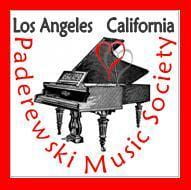 In celebration of two important impending moments in Polish history—Paderewski’s 70th death anniversary (June 29, 2011) and the Polish Presidency of the European Union Council (July 1- Dec. 31, 2011)—the Paderewski Music Society in Los Angeles held a concert in Zipper Hall of the Colburn School of Music on June 11, 2011. The evening opened with remarks from the Consul General in Los Angeles, Hon. Joanna Kozińska-Frybes, who exclaimed “I have discovered Paderewski in California!” as she shared her growing admiration for the great historical figure who once considered California a second home. She also outlined the three primary focal points for the Polish government during its 6-month Presidency of the E.U. Council—“integration, security and openness”—goals which she again tied back to qualities espoused and demonstrated by Paderewski.
In celebration of two important impending moments in Polish history—Paderewski’s 70th death anniversary (June 29, 2011) and the Polish Presidency of the European Union Council (July 1- Dec. 31, 2011)—the Paderewski Music Society in Los Angeles held a concert in Zipper Hall of the Colburn School of Music on June 11, 2011. The evening opened with remarks from the Consul General in Los Angeles, Hon. Joanna Kozińska-Frybes, who exclaimed “I have discovered Paderewski in California!” as she shared her growing admiration for the great historical figure who once considered California a second home. She also outlined the three primary focal points for the Polish government during its 6-month Presidency of the E.U. Council—“integration, security and openness”—goals which she again tied back to qualities espoused and demonstrated by Paderewski.
These opening remarks were followed by a reading of excerpts from Paderewski’s famous address given in Chicago’s Auditorium Theater in February 1916 by Paul Jan Zdunek, as well as a screening of Prezydent Ministrów [President of the Ministers], a documentary directed by Wiesław Dąbrowski of Ave Arte in Warsaw.
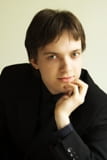 The final part of the evening featured a recital performed by young pianist Piotr Kosinski, First Prize winner of the 2010 Paderewski International Piano Competition in Los Angeles. Kosinski performed a program including Rachmaninoff’s Piano Sonata No. 2, Op. 36; Chopin’s Ballade in G Minor, Op. 23 and Nocturne in G Major, Op. 37 No. 2; Szymanowski’s Mazurkas, Op. 50 no. 1-4; and Liszt’s Hungarian Rhapsody No. 6. While he demonstrated a beautifully light touch and innate musicality throughout the program, Kosinski was clearly most at home in the music of his countrymen, and especially Szymanowski. The lively mazurka rhythms flowed from a deep cultural memory into Kosinski’s fingers, and there seemed to be little separation between piano and performer.
The final part of the evening featured a recital performed by young pianist Piotr Kosinski, First Prize winner of the 2010 Paderewski International Piano Competition in Los Angeles. Kosinski performed a program including Rachmaninoff’s Piano Sonata No. 2, Op. 36; Chopin’s Ballade in G Minor, Op. 23 and Nocturne in G Major, Op. 37 No. 2; Szymanowski’s Mazurkas, Op. 50 no. 1-4; and Liszt’s Hungarian Rhapsody No. 6. While he demonstrated a beautifully light touch and innate musicality throughout the program, Kosinski was clearly most at home in the music of his countrymen, and especially Szymanowski. The lively mazurka rhythms flowed from a deep cultural memory into Kosinski’s fingers, and there seemed to be little separation between piano and performer.
IJP Comes Home to Jagiellonian University
 On June 24, the Institute of Musicology at Jagiellonian University in Krakow unveiled a monument of Ignacy Jan Paderewski – pianist, composer, Prime Minister of the Polish Government, and doctor honoris causa of the Jagiellonian University. The Institute and the recently retired head of its Paderewski Center for the Documentation of 19th Cent. Polish Music, Dr. Małgorzata Perkowska-Waszek (pictured at left), have long been champions of the legacy of Paderewski.
On June 24, the Institute of Musicology at Jagiellonian University in Krakow unveiled a monument of Ignacy Jan Paderewski – pianist, composer, Prime Minister of the Polish Government, and doctor honoris causa of the Jagiellonian University. The Institute and the recently retired head of its Paderewski Center for the Documentation of 19th Cent. Polish Music, Dr. Małgorzata Perkowska-Waszek (pictured at left), have long been champions of the legacy of Paderewski.
The monument was donated to the Jagiellonian University by Mr. Harry E. Blythe, a great promoter and collector of memorabilia of Paderewski who lives in Paso Robles, CA. The sculptor of the monument is Jesse Coursaut, a well known bronze artist from California’s Central Coast.
 The ribbon cutting was performed by University Rector, Dr. Charles Musioł, the Dean of the Faculty of History (under which the Institute of Musicology is housed), Dr. Andrew Banach, and Director of the Institute of Musicology, Dr. Renata Suchowiejko.
The ribbon cutting was performed by University Rector, Dr. Charles Musioł, the Dean of the Faculty of History (under which the Institute of Musicology is housed), Dr. Andrew Banach, and Director of the Institute of Musicology, Dr. Renata Suchowiejko.
The ceremony was attended by the Paderewski Festival delegation and included speeches by the Mayor Pro Tem of Paso Robles, John Hamon, and the Artistic Director of the Paderewski Festival in Paso Robles, Marek Zebrowski, who read prepared statements from Mr. Blythe and Anne Appleton-Strakacz, Paderewski’s goddaughter. The Deputy Marshal of Małopolska, Roman Ciepiela, and the Tarnów District Supervisor, Mieczysław Kras, also made statements, as well as the U.S. Consul General in Kraków, Allen S. Greenberg, who stated that the Tarnów-Paso Robles sister-city relationship was the strongest in the Małopolska region.
In addition to the proximity of Paderewski’s 70th death anniversary, the unveiling of the monument was part of Paderewski celebration of the 100th anniversary of Musicology at the Jagiellonian University. On the occasion of the Jubilee Year, a Cracow Musicology Graduate Congress was held earlier in the day, attended by about 150 graduates from Poland and abroad. Participants visited the restored Pusłowski Palace, in which the Institute of Musicology now resides, and viewed an exhibit entitled “Memories of Graduates of Musicology in Photographs.”
Later that evening, in the auditorium of the University’s Collegium Novum, Marek Zebrowski (piano) and Lars Hoefs (cello) performed a concert entitled “Chopin and Paderewski.” On the following day, June 25, young pianists who were participating in the Paderewski Festival Youth Exchange between Paso Robles, CA and Tarnów/Kąśna Dolna, Poland performed a special concert at the Institute of Musicology.
[Source: uj.edu.pl]
Polish President Honors Paderewski
 On June 29 in the courtyard of the Presidential Palace in Warsaw (pictured), President Bronisław Komorowski presided over an evening marking the 70th anniversary of Paderewski’s death. The highlight of the event was a performance of Paderewski’s Symphony in B minor Polonia, performed by Sinfonia Varsovia under conductor Jerzy Maksymiuk. Inspired by the events of 1893, Paderewski composed the work in 1907 as his “patriotic tribute to the Fatherland.” The concert was transmitted over TVP Kultura.
On June 29 in the courtyard of the Presidential Palace in Warsaw (pictured), President Bronisław Komorowski presided over an evening marking the 70th anniversary of Paderewski’s death. The highlight of the event was a performance of Paderewski’s Symphony in B minor Polonia, performed by Sinfonia Varsovia under conductor Jerzy Maksymiuk. Inspired by the events of 1893, Paderewski composed the work in 1907 as his “patriotic tribute to the Fatherland.” The concert was transmitted over TVP Kultura.
Before the concert, guests were shown a short film about Paderewski as pianist, composer, statesman and Prime Minister of independent Poland entitled Prezydent Ministrów [President of the Ministers]. This documentary was directed by Wiesław Dąbrowski and supported by the Ave Arte Foudation. In the opinion of Krystyna Szymańska, Director of the Paderewski Centre in Kąśna Dolna who was in attendance, the film was one of the best that she had seen on the subject.
In his introductory speech, President Komorowski recalled that Paderewski was a great Pole and European. He stressed that the concert was in celebration of and gratitude for a man who was both a great artist and an outstanding statesman. This idea of the important relationship between culture and statecraft is mirrored in the themes of the current six-month Polish Presidency of E.U., wherein cultural programs play a very prominent diplomatic role.
In addition to the President and First Lady, the event was attended by representatives of state authorities, church authorities, the diplomatic corps and leaders in the arenas of science and culture. It was the first concert in history to be held in the Presidential courtyard, but not the last, according to the head of the President’s press office, Joanna Trzaska-Wieczorek. She added that “the intention of President Bronisław Komorowski is that the courtyard and the beautiful rooms of the palace became a place of artistic and cultural events.”
[Sources: Polskie Radio, Informacyjna Agencja Radiowa, TVP, Photos:modaija.pl, wikipedia.org]
Herter Donation to National Library
 According to Mariola Nałęcz, Head Music Librarian of the Polish National Library in Warsaw, the Library received a very interesting gift on June 29, the death anniversary of Ignacy Jan Paderewski. The gift, donated by Mr. Joseph Herter (pictured)—an American musician, conductor and teacher who has been living in Warsaw since 1974—is comprised of items related to Paderewski that were published in the United States.
According to Mariola Nałęcz, Head Music Librarian of the Polish National Library in Warsaw, the Library received a very interesting gift on June 29, the death anniversary of Ignacy Jan Paderewski. The gift, donated by Mr. Joseph Herter (pictured)—an American musician, conductor and teacher who has been living in Warsaw since 1974—is comprised of items related to Paderewski that were published in the United States.
Among others items is a collection of piano works by various composers dedicated to the memory of Paderewski (Homage to Paderewski. Piano solo, published in New York in 1942). According to journalist Danuta Matloch of Polska Agencja Prasowa, Mariola Nałęcz said of the Homage to Paderewski: “Such a collection is a rarity in Polish collections. Among the composers who gave musical tribute to Paderewski are Bela Bartok, Feliks Roderyk Łabuński, and Zygmunt Stojowski.”
Also included in the donation were copies of The Etude Music Magazine from the years 1934-1955, in very good condition and featuring Paderewski on the cover. In addition to articles related to Paderewski, these volumes of The Etude also contain other polonica such as printings of music by Polish composers. Again, Nałęcz told PAP: “Among the most interesting articles include review of the first execution in the U.S. Paderewski’s only opera, Manru.” The gift will greatly enrich the collection of polonica music within the National Library.
[Source: press release, zyciewarszawy.pl, Photo credit: Tomasz Zakrzewski]
Polish Embassy in the US Celebrates IJP
On June 29, the Embassy of the Republic of Poland in Washington, D.C. hosted a commemoration of the life and music of Ignacy Jan Paderewski, the “modern immortal.” The evening program consisted of: readings of quotes of Paderewski’s speeches; a speech by Gen. Edward L. Rowny, head of the Paderewski Living Memorial organization; screening of a documentary film Paderewski. A Master of Tones and a Statesman by Bohdan Rączkowski; and a piano recital performance by John Robilette featuring music by Chopin, R. Schumann, Liszt and Paderewski.
John Robilette‘s piano interpretations are bold, imaginative and often unorthodox, with beautiful tone throughout. With an unusual background of training under former assistants to both Alfred Cortot and Artur Schnabel, as well as studies with Peter Feuchtwanger and Louis Kentner in London, Mr. Robilette is considered a fascinating link to an era of pianism long vanished. He is especially well-known for his many appearances before the Polish-American community and commemorative recitals for I. J. Paderewski. He is strongly convinced that “Paderewski represented not just great artistry, but also the ideals of freedom and the dignity of the human being, which enabled him to establish a free Poland after World War I. People need heroes in this age of cynicism. Paderewski was an authentic one.”
[Sources: press release, washington.polemb.net]
IJP Piano Links Poland and US
The visit of U.S. President Barack Obama to Poland on May 28, 2011, had a distinctly musical flavor, thanks to the presence of a unique symbol of Polish-American friendship. On the occasion of the State dinner held in Obama’s honor, a piano belonging to famous Polish pianist and politician, Ignacy Jan Paderewski, was loaned by the Polish National Museum to the Presidential Palace. The piano was built in 1925 and served Paderewski during tours through Europe.
Paderewski’s piano was a tangible reminder of the friendship forged between its owner and another U.S. president, Woodrow Wilson—whose inclusion of Poland in his famous Fourteen Points led to the reinstatement of sovereign Poland after WWI—and symbolized the continuation of good relations between the two countries. Flanked by photos of Paderewski and Wilson, the piano served as perfect backdrop for Polish President Stanisław Komorowski to greet his guest of honor.
[Source: se.pl, Photo: wiadomosci.gazeta.pl]
ACPC Convention Honors Paderewski
Adapted from Poloniatoday.com:
The American Council for Polish Culture (ACPC) announced on May 12, 2011, that its 63rd Annual Convention will take place July 14-17, 2011 in the John Paul II Polish American Cultural Center in Cleveland, Ohio. The Convention’s theme, “Celebrating the Maestro,” was selected to honor Ignacy Jan Paderewski (1860–1941), one of the most important figures in Polish history. His multifaceted activities as a composer, pianist, politician, statesman, and generous philanthropist distinguished him as one of the greatest personalities of the cultural and political scenes in Poland, and indeed the world, during the first half of the past century.
During the Convention, the dedication of a new Paderewski bust in the Polish Cultural Garden will take place on July 16, 2011, at 2:30 p.m. The ceremony will include a piano recital and a brief talk by Dr. James S. Pula, professor of history at Purdue University North Central and editor of the recently published The Polish American Encyclopedia.
The Polish Cultural Garden was dedicated in 1934, and is located in Rockefeller Park on Cleveland’s Eastside. It contains a hexagonal sunken court with colorful flowerbeds, shrubs and trees imported from Poland, including a tree from Chopin’s Polish estate.
Three bronze busts of prestigious members of the Polish nation are currently mounted on granite pedestals. They are of Copernicus, Sklodowska-Curie and Sienkiewicz. Originally, six busts of internationally famous Poles were placed in the outer circle of the garden. All of the busts were destroyed by vandals and sold for scrap in the 1970s. The Polish American Cultural Center continues its project of raising funds to restore and replace the missing original busts.
The ACPC is a national non-profit, charitable, cultural and educational organization that serves as a network and national leadership body among affiliated Polish-American cultural organizations throughout the United States. To learn more about the Convention or register to attend, visit www.polishcultureacpc.org or call (216) 431-0913.
[Source: poloniatoday.com]
News
Kaczmarek Premiere
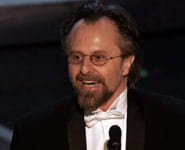 July 3, 2011 marked the 200th anniversary of the start of the events described in Pan Tadeusz, the great Polish epic written by Adam Mickiewicz. To celebrate the occasion, the world premiere of Koncertu Jankiela [Jankiel’s Concerto], written by Polish film composer and Oscar winner Jan AP Kaczmarek, took place at the National Philharmonic in Warsaw. It was performed by Sinfonia Varsovia and the percussion soloists of the Wasilinki Belarusian State Academy of Music, under the baton of Marc Minkowski. This new work was commissioned by the Adam Mickiewicz Institute.
July 3, 2011 marked the 200th anniversary of the start of the events described in Pan Tadeusz, the great Polish epic written by Adam Mickiewicz. To celebrate the occasion, the world premiere of Koncertu Jankiela [Jankiel’s Concerto], written by Polish film composer and Oscar winner Jan AP Kaczmarek, took place at the National Philharmonic in Warsaw. It was performed by Sinfonia Varsovia and the percussion soloists of the Wasilinki Belarusian State Academy of Music, under the baton of Marc Minkowski. This new work was commissioned by the Adam Mickiewicz Institute.
Jankiel is the name of the Jewish inn-keeper in Pan Tadeusz, which is the most famous piece of Polish Romantic literature. In the story, this character is a master of the dulcimer and he plays a medley of Polish patriotic tunes which opens with a joyous polonaise in praise of the Constitution of the Third of May 1791 and ends with Dąbrowski’s Mazurka, a song which later became Poland’s national anthem.
Also on the July 3rd concert program was the overture to the opera Dwie Chatki [Two Huts] by Karol Kurpiński and Symphony No. 3 ‘Eroica’ by Ludwig van Beethoven.
[Sources: thenews.pl, polmic.pl]
Year Of Władysław Szpilman
 Celebrations of this year’s 100th birth anniversary of Władysław Szpilman, whose life was immortalized in Roman Polanski’s film The Pianist, have begun. The ‘Year of Szpilman’ was inaugurated in the Southern Poland town of Sosnowiec on July 6, 2011, exactly 11 years after the composer and pianist died in Warsaw. Polish Radio has this report:
Celebrations of this year’s 100th birth anniversary of Władysław Szpilman, whose life was immortalized in Roman Polanski’s film The Pianist, have begun. The ‘Year of Szpilman’ was inaugurated in the Southern Poland town of Sosnowiec on July 6, 2011, exactly 11 years after the composer and pianist died in Warsaw. Polish Radio has this report:
It was [in Sosnowiec] that the famous Polish musician of Jewish origin was born on 5 December 1911. A commemorative plaque is placed on the house on 18 Targowa Street, where he was born and lived with his parents and two sisters.
A national contest for the best interpretation of Szpilman’s songs has been announced. Piotr Celej, its organiser, has said that the idea is to look for new arrangements and innovative interpretations of Szpilman’s hits so that to re-discover his compositional output.
The competition is open to all singers over 17 years of age. The finals will be held in Sosnowiec on 5 December.
Wladyslaw Szpilman studied the piano and composition in Warsaw and Berlin, and worked at Polish Radio for four years until the outbreak of war. He miraculously avoided capture by the Nazis.
Continue reading this article at www.thenews.pl.
For more information about the celebrations, and especially the National Song Contest, “AL LEGRO – Tribute to Szpilman,” visit: www.szpilman.pl.
[Sources: thenews.pl, dziennikzachodni.pl]
New Szymanowski Site
 A new website dedicated to the life and works of Polish composer Karol Szymanowski has been launched by the Warsaw University Library and the Adam Mickiewicz Institute: www.karolszymanowski.pl. This interactive portal presents Szymanowski not only as a highly accomplished musician, but also as a poet, writer, essayist and social activist. The site showcases the composer’s biography along with an extensive photo gallery illustrating each stage of the composer’s life.
A new website dedicated to the life and works of Polish composer Karol Szymanowski has been launched by the Warsaw University Library and the Adam Mickiewicz Institute: www.karolszymanowski.pl. This interactive portal presents Szymanowski not only as a highly accomplished musician, but also as a poet, writer, essayist and social activist. The site showcases the composer’s biography along with an extensive photo gallery illustrating each stage of the composer’s life.
Users can also listen to an array of orchestral, vocal piano and chamber works by Szymanowski such as the Stabat Mater Op. 53, which is known as one of the composer’s most accomplished works. Each recording is accompanied by detailed commentary including information about the composer’s sources of musical inspiration, which range from familial themes to Islam and the Orient, Antiquity and the Tatra mountains.
The site is currently available in both Polish and English, while German, French and Russian versions are also in the works.
[Source: culture.pl]
Updated Website For Kulenty
 The design of the website of Polish composer Hanna Kulenty—www.hannakulenty.com—has been overhauled, including the removal of all Flash elements so that it is more easily viewed on mobile devices. There is also the addition of an important: Kulenty’s Music Blog, at hannakulenty.com/01.1_news.html. Soon streaming audio will be added as well.
The design of the website of Polish composer Hanna Kulenty—www.hannakulenty.com—has been overhauled, including the removal of all Flash elements so that it is more easily viewed on mobile devices. There is also the addition of an important: Kulenty’s Music Blog, at hannakulenty.com/01.1_news.html. Soon streaming audio will be added as well.
[Source: press release]
Biweekly Composer Focus: Wojciech Ziemont Zych
 Wojciech Ziemowit Zych (b. 1976) studied at the Academy of Music in Kraków under Prof. Marek Stachowski, and under Prof. Peter-Jan Wagemans at the Rotterdam Conservatory. The piece Friends of Kaspar Hauser, commissioned by Deutschlandfunk and the Warsaw Autumn Festival, represented Polish Radio at the listening sessions of the 2005 UNESCO International Rostrum of Composers in Vienna.
Wojciech Ziemowit Zych (b. 1976) studied at the Academy of Music in Kraków under Prof. Marek Stachowski, and under Prof. Peter-Jan Wagemans at the Rotterdam Conservatory. The piece Friends of Kaspar Hauser, commissioned by Deutschlandfunk and the Warsaw Autumn Festival, represented Polish Radio at the listening sessions of the 2005 UNESCO International Rostrum of Composers in Vienna.
His compositions have been performed at many prestigious festivals in Poland and abroad. He primarily writes instrumental music. Major works include: Symphony No. 1 (2001–2002), Concerto for Bass Clarinet and Orchestra (2003), Hommage à Tadeusz Kantor for orchestra (2003), Friends of Kaspar Hauser for chamber orchestra (2004), Symphony No. 2 (2004–2005), Constantly Present Longing for bass clarinet, percussion, piano, and violin (2005), Hommage à György Kurtág for violin and bass clarinet (2005–2006), Rozedrganie for two pianos (2005), Stirrings of the Will for orchestra (2005–2006), Poetyka niedo-…/Niedo…-poetyka for harpsichord solo (2007), Retoryka niedo-…/ Niedo-…retoryka for string quartet (2007), Act of Getting Old in the Form of a Rondo and Letter Unfinished…, Letter Found… for percussion duo (2008).
In her article about this young composer for Biweekly, the English version of the popular culture magazine Dwutygodnik, Ewa Szczecińska writes the following:
In one, multi-layered figure, Wojciech Ziemowit Zych conjures up clashing opposites, launching a synthesis of seemingly incoherent details, “a reflection of the complexity of the modern world”, explains the composer.
Diverse types of movements and tempos, dance-like qualities skewed with a grimace and counterpointed with grotesque, a mad perpetuum mobile, and then suddenly: placidity and meditation. Zych’s music combines old conventions with modernity, a seemingly perfect example of 21st century postmodernism. And yet there are no collages to be found; reappropriation, pastiche, and plays on popular culture are also completely foreign to his art. Instead of breaking yet another taboo, it aims for grand syntheses and narration; instead of new media, it employs traditional instruments; instead of experiments with new techniques, it applies old ones in new contexts. What about fashionable composition techniques such as spectralism and microtones? Yes, but only in homeopathic doses.
Wojciech Ziemowit Zych, born 1976 in Warsaw, grew up in Białystok and studied in Kraków, Rotterdam, and Darmstadt. Asked about his masters, the spiritually and intellectually independent composer lists names from the Central and Eastern European canon: György Kurtág, György Ligeti, Alfred Schnittke, and Tadeusz Wielicki. He is an outsider from Kraków, one who remains entirely detached from the world of modern trends and fashions. While not a conservative, he does appreciate the idea of the traditional work of art and the seriousness that is so despised in our times.
Continue reading this article at www.biweekly.pl. To learn more about Zych, visit
www.polmic.pl, culture.pl or www.eucemusic.org.
[Source: biweekly.pl, Photo: Marta Filipczyk via PWM]
Masterclass At Schleswig-Holstein
From July 26-30, Polish-Canadian pianist Janina Fialkowska will present masterclasses for the first time during the prestigious Schleswig-Holstein Festival at the Musikhochschule in Lübeck, Germany. She will also perform a concert program on August 14, 2011 at 7:00 p.m., entitled “Rubenstein’s heir,” in the Förde Sparkasse am Lorentzendamm in Kiel.
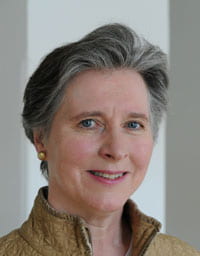 Janina Fialkowska performs on all the major stages around the globe. Her career has been greatly influenced by the legendary Arthur Rubinstein. In 1974, he became her mentor after listening to and meeting Janina Fialkowska at the Rubinstein competition. She has won special recognition for a series of important premieres, most notably the world premiere performance of a newly discovered Piano Concerto by Franz Liszt with the Chicago Symphony in 1990. Ms Fialkowska’s discography includes discs works by Fréderic Chopin, Franz Liszt, Szymanowski, Paderewski piano or Moritz Moszkowski.
Janina Fialkowska performs on all the major stages around the globe. Her career has been greatly influenced by the legendary Arthur Rubinstein. In 1974, he became her mentor after listening to and meeting Janina Fialkowska at the Rubinstein competition. She has won special recognition for a series of important premieres, most notably the world premiere performance of a newly discovered Piano Concerto by Franz Liszt with the Chicago Symphony in 1990. Ms Fialkowska’s discography includes discs works by Fréderic Chopin, Franz Liszt, Szymanowski, Paderewski piano or Moritz Moszkowski.
[Sources: press release, shmf.de]
Beethoven À La Stojowski
 British pianist Jonathan Plowright is the featured soloist for the inaugural concert of a five-year festival program entitled War and People. The Church of St. John’s Waterloo in London is the venue for the festival beginning on July 7 at 7:30 p.m. Opening night sees the Southbank Sinfonia, under the direction of conductor David Corkill, performing music of Mozart, Beethoven, Fauré and Mendelssohn. The orchestra joins forces with Mr. Plowright in performing Beethoven’s Piano Concerto No. 3 Op. 37 with the pianist using the cadenza written for it by Zygmunt Stojowski, one of Poland’s greatest Post-Romantic composers.
British pianist Jonathan Plowright is the featured soloist for the inaugural concert of a five-year festival program entitled War and People. The Church of St. John’s Waterloo in London is the venue for the festival beginning on July 7 at 7:30 p.m. Opening night sees the Southbank Sinfonia, under the direction of conductor David Corkill, performing music of Mozart, Beethoven, Fauré and Mendelssohn. The orchestra joins forces with Mr. Plowright in performing Beethoven’s Piano Concerto No. 3 Op. 37 with the pianist using the cadenza written for it by Zygmunt Stojowski, one of Poland’s greatest Post-Romantic composers.
Published in 1913 by Heugel, the cadenza might date, at least in part, from 1885 when the teenaged Stojowski made his debut as an orchestral soloist in Kraków playing the same Beethoven concerto. The local press reported that the young artist had written his own cadenza for the occasion. Seldom performed and basically unknown by most pianists, the cadenza adds a surprising Romantic Polish touch to opening night at the Waterloo Festival.
[JH]
Polish Representation In 2011 iPALPITI
 This year’s iPalpiti Orchestral Ensemble of International Laureates features violinist Robert Kowalski, who was born in Gdansk, Poland in 1985. Also on the 2011 roster is cellist Lars Hoefs, who has been featured on many PMC concerts and recently performed and mentored young students during the 2011 Paderewski Festival Youth Exchange in Kąśna Dolna.
This year’s iPalpiti Orchestral Ensemble of International Laureates features violinist Robert Kowalski, who was born in Gdansk, Poland in 1985. Also on the 2011 roster is cellist Lars Hoefs, who has been featured on many PMC concerts and recently performed and mentored young students during the 2011 Paderewski Festival Youth Exchange in Kąśna Dolna.
 Since it was founded by Eduard Schmieder in Dallas, Texas in 1991, iPalpiti has grown into an ensemble of international recognition, establishing a summer residency in Beverly Hills, California in 1999. iPalpiti [ee-PAHL-pit-ee is Italian for “heartbeat”] has performed to sold-out audiences in prestigious venues such as Concertgebouw (Amsterdam), Mozarteum Grosse Hall (Salzburg), Nikkei Hall (Tokyo), Disney Hall (Los Angeles), YMCA Jerusalem, Carnegie Hall (New York), and is invited as ensemble-in-residence to festivals in Slovenia, Israel, Carinthia, Belgium, Italy, Poland, and Martha Argerich Festival in Japan.
Since it was founded by Eduard Schmieder in Dallas, Texas in 1991, iPalpiti has grown into an ensemble of international recognition, establishing a summer residency in Beverly Hills, California in 1999. iPalpiti [ee-PAHL-pit-ee is Italian for “heartbeat”] has performed to sold-out audiences in prestigious venues such as Concertgebouw (Amsterdam), Mozarteum Grosse Hall (Salzburg), Nikkei Hall (Tokyo), Disney Hall (Los Angeles), YMCA Jerusalem, Carnegie Hall (New York), and is invited as ensemble-in-residence to festivals in Slovenia, Israel, Carinthia, Belgium, Italy, Poland, and Martha Argerich Festival in Japan.
While striving for perfection, iPalpiti considers each member a soloist. Referred to as a “Musical Peace Corps,” iPalpiti’s international membership brings unique insight to music making, promoting universal awareness and understanding. iPalpiti unites the next generation of musicians for professional collaboration in the future, creating a cultural network among over 200 artists from all over the world.
[Source: press release, www.ipalpiti.org]
“Poland..Why Not?” Pop Music Project
The Poland..Why Not? journey began in 2007, after its creator Brian Allan, a musical entrepreneur and former manager of Skylar Grey, discovered Poland had suffered long enough in the international music market. After making this revelation Brian called his former songwriting friends in Los Angeles, inviting them to Poland for 10 days to write songs, in English, with promising Polish artists for promotion outside of Poland. This became the first of many, now legendary, PWN Workshops.
Subsequently Rokket Music label took the reins of this musical innovation, taking Polish artists deep into the heart of Timbaland’s own production crew, via the sensational Jim Beanz, whilst also maintaining long existing relationships with Rob Hoffman and other writers, namely Jud Friedman, Steve Dorff, Shawn Donnell and Osmo Ikonen.
On June 10, the Poland..Why Not? 2011 campaign kicked off with the initiation of a competition for all Polish pop artists who want to win a trip to Los Angeles. Participants must purchase a ticket in an Esotiq store or any of the Cinema City theatres and send a text message with a code from the ticket. At the end of the July some participants will be invited for an audition. Winners chosen by the jury during auditions will fly to Los Angeles to the music video set of the project’s two main stars: Natasza Urbańska and Patricia Kazadi. The jury will consist of Brian Allan, Jan Weckstrom—co-founder of Rokket Music, and one of the stars of the project.
[Source: facebook.com]
Awards
Łukaszewski Honored By Polish Primate
 On June 12, 2011, the special “Silver Pipe” [Srebrna piszczałka] Award of the Polish Primate was presented to Polish composer Paweł Łukaszewski. The Silver Pipe is awarded annually for outstanding achievements and contributions to the development of sacred music in Poland.
On June 12, 2011, the special “Silver Pipe” [Srebrna piszczałka] Award of the Polish Primate was presented to Polish composer Paweł Łukaszewski. The Silver Pipe is awarded annually for outstanding achievements and contributions to the development of sacred music in Poland.
The ceremony took place at St. John’s Cathedral during the 21st International Festival of Sacred Music (June 5-12 in Warsaw). The event marked the 500th concert in the Warsaw Cathedral’s “Religious Music Concert Series.” Performers included the Warsaw Cathedral Choir, the Warsaw Cathedral Instrumental Ensemble, soprano Jolanta Kaufman, and conductor Dariusz Zimnicki. The program consisted of Wincenty Maxylewicz’s Gloria Tibi Trinitas and Franciszek Lessel’s Msza Polska.
[Sources: lukaszewski.org.uk, pwm.com.pl]
Penderecki Composers’ Competition
 On July 5, winners of the first Krzysztof Penderecki Composers’ Competition were announced. The Competition is organized by the Polish Chamber Orchestra in Sopot with support from prof. Krzysztof Penderecki and within the framework of the 1st International Music Festival “Sopot Classic”, which will be held on August 4-7, 2011.
On July 5, winners of the first Krzysztof Penderecki Composers’ Competition were announced. The Competition is organized by the Polish Chamber Orchestra in Sopot with support from prof. Krzysztof Penderecki and within the framework of the 1st International Music Festival “Sopot Classic”, which will be held on August 4-7, 2011.
The jury was composed of: prof. Krzysztof Meyer – chairman, prof. Marian Borkowski, prof. Eugeniusz Knapik and prof. Krzysztof Olczak. After due consideration of the 30 compositions submitted, the jury decided to award two First prizes, shared ex aequo,to:
- Natalia Cherniy from Wrocław, for the composition Beautiful strings (10,000 PLN)
- Kamil Cieślikowi of Gdańsk, for the composition Music for Strings (10,000 PLN)
The Krzysztof Penderecki Composers’ Competition aims at inspiring an environment conducive to creativity in the composition of classical music and to popularize the works of young artists. The winning compositions will be performed during the “Sopot Classic” Festival.
[Source: polmic.pl]
Winners Of Lutosławski Young Conductors’ Competition
![]() Winners of the 5th Witold Lutosławski International Competition for Young Conductors in Białystok have been announced. The 2011 winners are:
Winners of the 5th Witold Lutosławski International Competition for Young Conductors in Białystok have been announced. The 2011 winners are:
- First Prize: Daniel Huppert of Germany (5.000 Euro)
- Second Prize: Sho Itoh of Japan (3.000 Euro)
- Third Prize: Chin-Chao Lin of Taiwan (1.500 Euro)
- Honorable mentions: Stilian Kirov of Bulgaria, Kateryna Osadcha of Ukraine and Daniel Smith of Australia
[Source: filharmonia.bialystok.pl]
Festivals
7th Festival Of Polish Music
 On July 15-24, 2011, the Polish Music Festival will be held for the seventh time in Kraków. As always, the programs feature only the music of Polish composers, both new and old. Every lover of Polish classical music will find in it something of interest in this year’s edition, featuring repertoire that is expansive in its diversity and richness, and an impressive roster of performers, from Poland and abroad. The aim of the Festival is to promote Polish music both locally and around the world.
On July 15-24, 2011, the Polish Music Festival will be held for the seventh time in Kraków. As always, the programs feature only the music of Polish composers, both new and old. Every lover of Polish classical music will find in it something of interest in this year’s edition, featuring repertoire that is expansive in its diversity and richness, and an impressive roster of performers, from Poland and abroad. The aim of the Festival is to promote Polish music both locally and around the world.
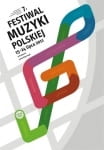 Festival highlights include: Grażyna Bacewicz’s Symphony No. 3 performed by Sinfonietta Cracovia (July 15); Karol Szymanowski’s Seven Songs to the words of James Joyce op.54, performed by pianist Francois Dumont and soprano Helen Kearns (July 18); Hanna Kulenty’s String Quartet no. 4 performed by the world-famous Kronos Quartet (July 22)—[Kronos Quartet is also slated to perform the world première of Kulenty’s String Quartet No.5 in the Netherlands on May 19, 2012]; Karol Kurpiński’s Te Deum performed by the Kraków Philharmonic Choir (July 24); Frederic Chopin’s Sonata in B minor op.58 performed by Nikolai Khozyainowa, finalist last year’s Chopin Competition.
Festival highlights include: Grażyna Bacewicz’s Symphony No. 3 performed by Sinfonietta Cracovia (July 15); Karol Szymanowski’s Seven Songs to the words of James Joyce op.54, performed by pianist Francois Dumont and soprano Helen Kearns (July 18); Hanna Kulenty’s String Quartet no. 4 performed by the world-famous Kronos Quartet (July 22)—[Kronos Quartet is also slated to perform the world première of Kulenty’s String Quartet No.5 in the Netherlands on May 19, 2012]; Karol Kurpiński’s Te Deum performed by the Kraków Philharmonic Choir (July 24); Frederic Chopin’s Sonata in B minor op.58 performed by Nikolai Khozyainowa, finalist last year’s Chopin Competition.
For a full listing of all events taking place throughout Kraków, visit the official Festival website: www.fmp.org.pl
This event is part of Attention Culture!, the Cultural Program of the 2011 Polish EU Presidency, and is held under the auspices of The President of the City of Kraków – Jacek Majchrowski.
[Sources: pwm.com.pl, culture.pl]
Festival Of Szymanowski’s Music
The 34th edition of the “Days of Karol Szymanowski’s Music” in Zakopane will take place between July 21-31, 2011. The Festival is organized by the Karol Szymanowski Society in Zakopane. In addition to music of Karol Szymanowski, this year the Festival will feature compositions by Polish composers Knapik, Tansman, Lutosławski, Sikora, Chopin, Szeligowski, Bacewicz, Szymonowicz, Moniuszko, Kisielewski and Baird, as well as Ravel, de Falla, Schuman, Granados, Assad, Piazzolla, Debussey and Satie.
Performers include: pianists Maciej Łukaszczyk, Teresa Czekaj, Mateusz Lasatowicz, Magdalena Lisak and Wojciech Świtała; guitarist Ewa Jabłczyńska and Dariusz Kupiński; baritone Jarosław Kitala; violinist Piotr Pławner; and ensembles Kwartet Śląski and Kapela Góralska.
For a detailed schedule, please visit: www.szymanowski.zakopane.pl.
[Source: szymanowski.zakopane.pl]
Summer Jazz Festivals
Although originally an American musical tradition, jazz has taken on a life and tradition of its own within Polish musical and social culture [to learn more, visit www.polishjazz.com]. Summertime is one of the best times to experience this phenomenon, as jazz musicians from around Poland and around the world flock to several internationally renowned festivals. Below are some the festivals happening in Warsaw and Kraków during July.
Jazz in the Old Town
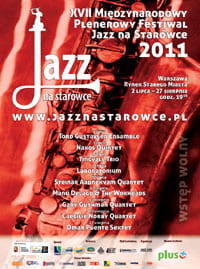 From July 2 – August 27, 2011 in Warsaw’s Old Town Square, the 17th edition of the Jazz in the Old Town Festival will take place. This year’s lineup features the: Tord Gustavsen Ensamble, Naxos Quintet, Tingvall Trio, Laboratorium, Steinar Aadnekvam Quartet, Manu Delago & The Wokheads, Gary Guthman Quartet, Caecilie Norby Quartet, and Omar Puente Sextet. For details, see a full schedule at: www.jazznastarowce.pl.
From July 2 – August 27, 2011 in Warsaw’s Old Town Square, the 17th edition of the Jazz in the Old Town Festival will take place. This year’s lineup features the: Tord Gustavsen Ensamble, Naxos Quintet, Tingvall Trio, Laboratorium, Steinar Aadnekvam Quartet, Manu Delago & The Wokheads, Gary Guthman Quartet, Caecilie Norby Quartet, and Omar Puente Sextet. For details, see a full schedule at: www.jazznastarowce.pl.
The International Open Air Festival – Jazz at the Old Town Square is one of the largest and most popular jazz festivals in Poland and Europe. After more than 15 years on the jazz music scene, about 40,000 jazz fans gather each summer to see major local and international jazz greats all summer long for free.
[Source: jazznastarowce.pl]
Piwnica pod Baranami Summer Jazz Festival
The 16th Annual Summer Jazz Festival at the Piwnica pod Baranami [Cellar under the Rams] will take place from July 3-31. The Festival will host such worldwide jazz stars as Chick Corea, Jan ‘Ptaszyn’ Wróblewski, Stanley Clarke, Lenny White, Jan Boba, Frank Gambale, Jarek Śmietana, Krzesimir Dębski, Jean-Luc Ponty and more. The diversity embodied in the different concerts of the festival makes it a great time for jazz lovers to catch some favorite music while immersed in the magical atmosphere of Kraków and legendary club Piwnica pod Baranami.
 This year’s Jazz Lamb Statuette was awarded to pianist Jan Boba during the opening ceremony on July 3. On July 16, the annual Jazz Night will be held outside in the Mały Rynek [Small Square]. The 4-hour performance will include three sets by some of the greatest Polish jazz musicians:
This year’s Jazz Lamb Statuette was awarded to pianist Jan Boba during the opening ceremony on July 3. On July 16, the annual Jazz Night will be held outside in the Mały Rynek [Small Square]. The 4-hour performance will include three sets by some of the greatest Polish jazz musicians:
- 6:00 – 7:00 PM: “Spring Suite” Jarek Śmietana with symphonic orchestra conducted by Krzesimir Dębski
- 7:00 – 8:30 PM: Grzech Piotrowski World Orchestra and Guests
- 8:30 -10:00 PM: The Syndicate
The Summer Jazz Festival at Piwnica Pod Baranami was organized for the first time in 1996 during the celebration of the 40th anniversary of Piwnica pod Baranami. During the last seven years, the top Polish musicians have performed at the Festival, including: Adam Makowicz, Tomasz Stańko, Urszula Dudziak, Michał Urbaniak, Zbigniew Namysłowski, Jarek Śmietana, Wojciech Karolak, Jan “Ptaszyn” Wróblewski, Leszek Możdżer, Piotr Wojtasik, and more. Many foreign stars have also performed, including: Lee Konitz, Brandford Marsalis, Eddie Henderson, Greg Osby, Hamiett Bluiet, Nigel Kennedy, Larry Coryell, The Rosenberg Trio, Rashied Ali, Ricky Ford, John Abercrombie, Hiram Bullock, Leni Stern, Rachel Z, Vadim Brodski, Pierre Blanchard, Larry Koonse, amongst others.
For a complete calendar of concerts and lineup of artists, please visit www.cracjazz.com.
[Source: cracjazz.com]
Warsaw Summer Jazz Days
 The 20th anniversary edition of the Warsaw Summer Jazz Days Festival will take place from July 17-22 in Hoover Square and Congress Hall. Festival highlights include concerts by Nublu Orchestra conducted by Butch Morris, Jeff Beck, Avishai Cohen “Seven Seas,” and Cassandra Wilson.
The 20th anniversary edition of the Warsaw Summer Jazz Days Festival will take place from July 17-22 in Hoover Square and Congress Hall. Festival highlights include concerts by Nublu Orchestra conducted by Butch Morris, Jeff Beck, Avishai Cohen “Seven Seas,” and Cassandra Wilson.
The idea of the Warsaw Summer Jazz Days festival was introduced in 1992 and since has grown to be one of the most important jazz festivals in Europe. It has its dedicated fans not only in Poland but also abroad. The world class of the festival is not to be undermined.
The main aim of the Festival has remained unchanged—it promotes contemporary jazz music by hosting the newest and most innovative performances and gathering creative artists of contrasting backgrounds. This is why it provides listeners with the best music and cultures from all over the world. By introducing key international figures, including many emerging talents, the Festival occupies an essential place in the international jazz scene.
[Source: adamiakjazz.pl]
Organ Concerts In Kraków
During the months of July and August, the city of Kraków will host the 21st Annual International Festival of Summer Organ Concerts. The festival has a long history and a loyal audience that continues to expand. In the early years, the Festival focused on Polish organists, but over the years it has risen to an international levelwith musicians from the rest of Europe, Japan, USA and South Africa. Mirosław Semeniuk-Podraza, professor in the Music Academy in Kraków, serves as the artistic director of the Festival.
The concerts are held every Thursday in the most beautiful churches of Poland’s ancient capital, including the St. Mary’s Basilica, the Holy Cross Church, the Paulist Basilica on the Rock, and the Carmelite Basilica “In the Sands.” Artists such as Per Ahlman, Roman Perucki, Tobias Horn, Cristina Banegas, Keiko Inoue, Anne Schneider, and Emanuelle Cardi, are scheduled to perform.
[Source: dworek.krakow.pl]
Performances
Jazz At The Kosciuszko Fdn
 In celebration of the shortest night of the year, Polish-born guitarist Pawel Ignatowicz performed a concert of jazz with world music influences with his quintet at the Kosciuszko Foundation in New York on June 24. In addition to Ignatowicz, the Pawel Ignatowicz Quintet includes Mark Manczuk – drums, Dan Asher – Bass, Lukasz Kowalski – piano, Adam Baldych – violin.
In celebration of the shortest night of the year, Polish-born guitarist Pawel Ignatowicz performed a concert of jazz with world music influences with his quintet at the Kosciuszko Foundation in New York on June 24. In addition to Ignatowicz, the Pawel Ignatowicz Quintet includes Mark Manczuk – drums, Dan Asher – Bass, Lukasz Kowalski – piano, Adam Baldych – violin.
[Source: press release
Discography
Maciejewski – Complete Piano Mazurkas
 Roman Maciejewski. Complete Piano Mazurkas
Roman Maciejewski. Complete Piano Mazurkas
Anna Brożek, piano
Sarton 003-4-2 (2CD)
From the Polskie Nagrania Muza website:
This album is the World Premiere recording of the entire catalogue of Roman Maciejewski’s known mazurkas—called “the pearl of Polish piano literature” by Stefan Kisielewski. For several reasons it is difficult to specify the exact number of mazurkas composed by Maciejewski. First, Maciejewski did not care about their release and did not make available to other pianists – he simply composed them then put them into a drawer or suitcase to be stored. Second, among the surviving manuscripts there are often many versions, sometimes significantly different from each other, of one piece, as well as those that appear to be unfinished fragments of mazurkas.
However, in 2008, PWM and pianist Michał Wesołowski undertook the task of cataloguing and publishing Maciejski’s 40 known mazurkas. The order of works on this CD release corresponds to the numbering assigned by PWM.
[Source: polskienagrania.com.pl]
Acte Preablable – World Premiere Recordings
 Robert Bukowski – Looking Into the Mirrors of the Past
Robert Bukowski – Looking Into the Mirrors of the Past
Robert Bukowski (1983): Nawałnica (The Storm); Bramy Kościoła (Gates of the Church); Małżeństwo (The Marriage); Pogrzeb mnicha (The Funeral of the Monk); Bohaterom polskim II wojny światowej (To the Polish Heroes of the Second World War); O nieszczęsnej miłości (About Wretched Love); Zranione serce (The Wounded Heart)
AP0213
 Andrzej Dziadek – Piano music
Andrzej Dziadek – Piano music
Andrzej Dziadek (1957): Two Bagatelles for piano (1991); Nocturne for piano (2001); Bells for piano (2004); Three pieces for Piano for 4 hands (2008/9); Variations on the Prelude in A Major of Frederic Chopin (2010); Concerto for Piano and Orchestra (2nd version, 2010)
Andrzej Jungiewicz, piano; Magdalena Lisak, piano; Zbigniew Raubo, piano; Gabriela Szendzielorz, piano; National Polish Radio Symphony Orchestra; Michał Klauza, cond.
AP0215
 Marcin Kopczyński – One man, a few shadows
Marcin Kopczyński – One man, a few shadows
Marcin Kopczyński (1973): Recordare Virgo Mater op. 44 (2007); Dolorosa op. 38 a (2005); Zwiastowanie [Annunciation] op. 27 a – words: Leopold Staff (2004); Uwielbiam Panie, Twe przebite ręce [I adore, Lord, your perforated hands] op. 30 – words: Leopold Staff (2004); Felices sensus op. 40 (2006); Lacrimosa op. 1 no. 1 (1990); Regina mundi op. 48 (2008); Concerto da camera per chitarra “Tre immagini” op. 41 (2006); Piano sonata no. 2 op. 19 (1999); Piano sonata no. 4 op. 49 (2008); Violin sonata no2 op. 17 (1999, 2006)
Ingrid Gápová, soprano; Krzysztof Meisinger, guitar; Karolina Wróbel-Krzysztoforska, violin; Marcin Kopczyński, piano; Bartłomiej Wezner, piano; Radosław Sobczak, piano; Marta Osowska-Utrysko, piano
AP0216
 Ludomir Różycki – Ballade Op. 18 – I Piano concerto Op. 43
Ludomir Różycki – Ballade Op. 18 – I Piano concerto Op. 43
Ludomir Różycki (1883-1953): Ballade Op. 18 and Piano concerto No. 1 Op. 43
Krystyna Makowska-Ławrynowicz, piano; Polish Radio & TV Orchestra in Kraków; Szymon Kawalla, cond.; Andrzej Straszyński, cond.
AP0217
 Ludomir Różycki – Violin concerto Op. 70 – Violin miniatures
Ludomir Różycki – Violin concerto Op. 70 – Violin miniatures
Ludomir Różycki (1883-1953): Violin concerto Op. 70; Deux Mélodies pour violon et piano Op. 5; Deux Nocturnes pour violon et piano Op. 30; Transcriptions for violin and piano from the ballet “Pan Twardowski” Op. 45
Ewelina Nowicka, violin; Polish National Radio Symphony Orchestra in Katowice; Zygmunt Rychert, cond.; Pola Lazar, piano; Michał Krężlewski, piano
AP0219
 Władysław Żeleński (1837-1921) – String Quartets
Władysław Żeleński (1837-1921) – String Quartets
Władysław Żeleński (1837-1921): String Quartet in F major Op. 28 and String Quartet in A major Op. 42
Four Strings Quartet: Lucyna Fiedukiewicz, 1st violin; Grzegorz Witek, 2nd violin; Beata Raszewska, viola; Łukasz Tudzierz, cello
AP0236
 Juliusz Łuciuk: Gesang am Brunnen – oratorio
Juliusz Łuciuk: Gesang am Brunnen – oratorio
Juliusz Łuciuk (1927): Gesang am Brunnen – oratorio
Bożena Harasimowicz-Haas, soprano; Jacek Laszczkowski, tenor; Janusz Borowski, baritone; José Maria Florencio, conductor
AP0240
Kulenty on DUX
 Hanna Kulenty – Music 4
Hanna Kulenty – Music 4
Hanna Kulenty (b. 1961): GG – Concerto (2009) for harpsichord and string orchestra; Music for Roy (2010) for mixed choir and chamber orchestra; Breathe (1987) for string orchestra; and Sinequan Forte B (1994) for amplified cello and chamber orchestra
Gośka Isphording (harpsichord); Bartosz Koziak (cello); Wrocław Chamber Orchestra Leopoldinum, Ernst Kovacic, cond.; Witold Lutosławski Philharmonic Choir of Wrocław
DUX 0823
On May 13, 2011, the CD ‘Hanna Kulenty – Music 4’ was presented at the National Philharmonic in Warsaw. The album was released by the Wrocław Philharmonic and DUX Records, and features a painting created by the composer on the cover. It contains 4 works performed by the Wrocław Chamber Orchestra Leopoldinum conducted by Ernst Kovacic. All compositions were recorded in the studio, in presence of the composer.
During the release concert and on the following day, Kulenty’s Trumpet Concerto was performed twice at the Warsaw Philharmonic Concert Hall. Marco Blaauw was the soloist of this award-winning composition with the Warsaw Philharmonic Symphony Orchestra, led by Swedish conductor Niklas Willén. Also on the program: Jean SIBELIUS – Symphonic Poem Finland op. 26 and Carl NIELSEN – Symphony No. 3 op. 27 Espansiva.
[Sources: hannakulenty.com, filharmonia.pl]
Beczała’s Slavic Opera Arias
 Slavic Opera Arias
Slavic Opera Arias
Selections from Borodin’s Prince Igor, Dvořák’s Rusalka, Moniuszko’s The Haunted Manor, The Raftsman and Halka, Nowowiejski’s The Legend of the Baltic, Rachmaninoff’s Aleko, Tchaikovsky’s Eugene Onegin and The Queen of Spades, Żeleński’s Janek and others
Piotr Beczała, tenor; Polish Radio Orchestra; Łukasz Borowicz, cond.; Katarzyna Bak, mezzosoprano;
Orfeo C814101A
From a review by Tomasz Cyz, Editor-in-chief of Biweekly.pl:
The character of Slavic Opera Arias by Piotr Beczała (and the Polish Radio Orchestra conducted by Łukasz Borowicz) is determined by the choice of repertoire itself. Slavic arias, Slavic opera – an idiom defining the geographical and cultural area, the language and tone, colour and style. And therefore: melodiousness, melancholy (or nostalgia), tenderness, love, sadness, heroism. The album doubtless benefits from the fact that the performers feel at home in this “Slavic” space. And no wonder.
From a review by David Shengold, writer for Opera News – the disc received the “Editor’s Choice” designation in Feb. 2011, Vol. 75 No. 8:
Piotr Beczala’s second aria recital for Orfeo (following a 2007 French and Italian release) is splendid, one of the most bracing aria programs in years. This highly intelligent Polish tenor has allowed his talent, voice and career to develop fully and organically without the potentially dangerous press-agentry that thrusts so many younger singers toward premature decline.
See other reviews in the Financial Times and at Operanostalgia.be.
[Source: biweekly.pl]
Anniversaries
Born This Month
- July 04, 1904 – Artur MALAWSKI, composer (d. 1957)
- July 06, 1837 – Władysław ŻELEŃSKI, composer (also a doctor of philosophy, d.1921)
- July 09, 1931 – Eugeniusz KNAPIK, composer
- July 10, 1936 – Jan Wincenty HAWEL, composer and conductor
- July 10, 1835 – Henryk WIENIAWSKI, violin virtuoso & composer (d. 1880, Moscow)
- July 10, 1929 – Tadeusz STRUMIŁŁO, musicologist (d. 1956)
- July 13, 1775 – Antoni Henryk RADZIWIŁŁ, composer, cellist, patron of arts (d. 1833)
- July 14, 1926 – Jan KRENZ, conductor & composer
- July 16, 1947 – Grażyna PSTROKOŃSKA-NAWRATIL, composer
- July 17, 1932 – Wojciech KILAR, composer
- July 22, 1930 – Leoncjusz CIUCIURA, composer
- July 23, 1884 – Apolinary SZELUTO, composer, member of Młoda Polska [Young Poland] group (d. 1966)
- July 26, 1928 – Tadeusz BAIRD, composer (d. 1982)
- July 26, 1922 – Andrzej KOSZEWSKI, composer (choral music)
- July 29, 1943 – Marta PTASZYŃSKA, composer & percussionist
- July 31, 1810 – Julian FONTANA, close friend and musical associate of Chopin (d.1869)
Died This Month
- July 1, 2001 – Halina CZERNY-STEFANSKA (b. 1922), pianist
- July 6, 1911 – Kazimierz HOFMANN (b. 1842), pianist, composer, and father of the renowned virtuoso and director of Curtis Institute, Józef Hofmann
- July 8, 1906 – Franciszek BORNIK (b. 1870), priest, conductor, writer
- July 21, 1964 – Zygmunt SITOWSKI (b. 1906), musicologist
- July 23, 1829 – Wojciech BOGUSŁAWSKI (b. 1757), the first theatre director in Poland, the author of several opera libretti (set by J. Stefani and J. Elsner)
- July 23, 1909 – Zygmunt NOSKOWSKI (b. 1846), composer, pedagogue and conductor
- July 25, 1831 – Maria SZYMANOWSKA (b. 1789), pianist and composer
